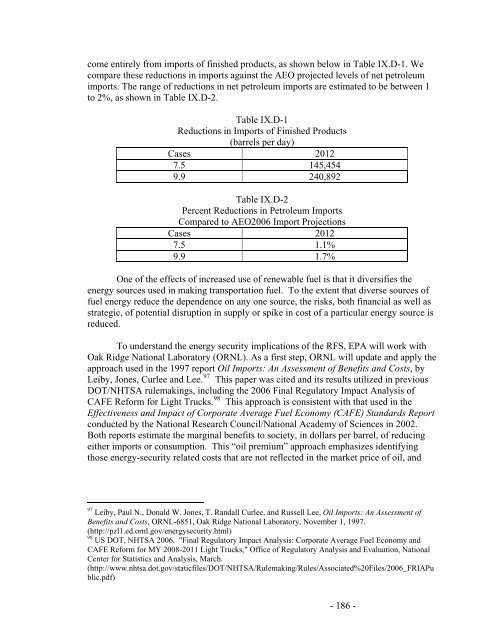Regulation of Fuels and Fuel Additives: Renewable Fuel Standard ...
Regulation of Fuels and Fuel Additives: Renewable Fuel Standard ...
Regulation of Fuels and Fuel Additives: Renewable Fuel Standard ...
Create successful ePaper yourself
Turn your PDF publications into a flip-book with our unique Google optimized e-Paper software.
come entirely from imports <strong>of</strong> finished products, as shown below in Table IX.D-1. We<br />
compare these reductions in imports against the AEO projected levels <strong>of</strong> net petroleum<br />
imports. The range <strong>of</strong> reductions in net petroleum imports are estimated to be between 1<br />
to 2%, as shown in Table IX.D-2.<br />
Table IX.D-1<br />
Reductions in Imports <strong>of</strong> Finished Products<br />
(barrels per day)<br />
Cases 2012<br />
7.5 145,454<br />
9.9 240,892<br />
Table IX.D-2<br />
Percent Reductions in Petroleum Imports<br />
Compared to AEO2006 Import Projections<br />
Cases 2012<br />
7.5 1.1%<br />
9.9 1.7%<br />
One <strong>of</strong> the effects <strong>of</strong> increased use <strong>of</strong> renewable fuel is that it diversifies the<br />
energy sources used in making transportation fuel. To the extent that diverse sources <strong>of</strong><br />
fuel energy reduce the dependence on any one source, the risks, both financial as well as<br />
strategic, <strong>of</strong> potential disruption in supply or spike in cost <strong>of</strong> a particular energy source is<br />
reduced.<br />
To underst<strong>and</strong> the energy security implications <strong>of</strong> the RFS, EPA will work with<br />
Oak Ridge National Laboratory (ORNL). As a first step, ORNL will update <strong>and</strong> apply the<br />
approach used in the 1997 report Oil Imports: An Assessment <strong>of</strong> Benefits <strong>and</strong> Costs, by<br />
Leiby, Jones, Curlee <strong>and</strong> Lee. 97 This paper was cited <strong>and</strong> its results utilized in previous<br />
DOT/NHTSA rulemakings, including the 2006 Final Regulatory Impact Analysis <strong>of</strong><br />
CAFE Reform for Light Trucks. 98 This approach is consistent with that used in the<br />
Effectiveness <strong>and</strong> Impact <strong>of</strong> Corporate Average <strong>Fuel</strong> Economy (CAFE) St<strong>and</strong>ards Report<br />
conducted by the National Research Council/National Academy <strong>of</strong> Sciences in 2002.<br />
Both reports estimate the marginal benefits to society, in dollars per barrel, <strong>of</strong> reducing<br />
either imports or consumption. This “oil premium” approach emphasizes identifying<br />
those energy-security related costs that are not reflected in the market price <strong>of</strong> oil, <strong>and</strong><br />
97 Leiby, Paul N., Donald W. Jones, T. R<strong>and</strong>all Curlee, <strong>and</strong> Russell Lee, Oil Imports: An Assessment <strong>of</strong><br />
Benefits <strong>and</strong> Costs, ORNL-6851, Oak Ridge National Laboratory, November 1, 1997.<br />
(http://pzl1.ed.ornl.gov/energysecurity.html)<br />
98 US DOT, NHTSA 2006. "Final Regulatory Impact Analysis: Corporate Average <strong>Fuel</strong> Economy <strong>and</strong><br />
CAFE Reform for MY 2008-2011 Light Trucks," Office <strong>of</strong> Regulatory Analysis <strong>and</strong> Evaluation, National<br />
Center for Statistics <strong>and</strong> Analysis, March.<br />
(http://www.nhtsa.dot.gov/staticfiles/DOT/NHTSA/Rulemaking/Rules/Associated%20Files/2006_FRIAPu<br />
blic.pdf)<br />
- 186 -
















